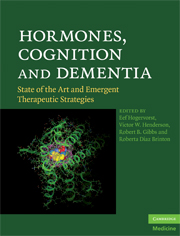Book contents
- Hormones, Cognition and Dementia
- Hormones, Cognition and Dementia
- Copyright page
- Contents
- Contributors
- Preface
- Section 1 Estrogens and cognition: perspectives and opportunities in the wake of the Women's Health Initiative Memory Study
- Section 2 Varieties of estrogenic therapy
- Section 3 Potential modulators and modifiers of estrogenic effects
- Section 4 Possible genetic factors related to hormone treatment effects
- Section 5 Testosterone, estradiol and men, and sex hormone binding globulin
- Chapter 19 Androgens and cognitive functioning in women
- Chapter 20 The role of estradiol in testosterone treatment
- Chapter 21 Endogenous testosterone levels and cognitive aging in men
- Chapter 22 Clinical trials and neuroimaging studies of testosterone in men: insights into effects on verbal memory
- Chapter 23 Testosterone therapy and Alzheimer's disease: potential for treatment and prevention in women
- Chapter 24 Endogenous estradiol and dementia in elderly men: the roles of vascular risk, sex hormone binding globulin, and aromatase activity
- Chapter 25 Testosterone regulates Alzheimer's disease pathogenesis
- Section 6 Gonadotropin effects
- Index
- Plate Section
Chapter 22 - Clinical trials and neuroimaging studies of testosterone in men: insights into effects on verbal memory
from Section 5 - Testosterone, estradiol and men, and sex hormone binding globulin
Published online by Cambridge University Press: 06 July 2010
- Hormones, Cognition and Dementia
- Hormones, Cognition and Dementia
- Copyright page
- Contents
- Contributors
- Preface
- Section 1 Estrogens and cognition: perspectives and opportunities in the wake of the Women's Health Initiative Memory Study
- Section 2 Varieties of estrogenic therapy
- Section 3 Potential modulators and modifiers of estrogenic effects
- Section 4 Possible genetic factors related to hormone treatment effects
- Section 5 Testosterone, estradiol and men, and sex hormone binding globulin
- Chapter 19 Androgens and cognitive functioning in women
- Chapter 20 The role of estradiol in testosterone treatment
- Chapter 21 Endogenous testosterone levels and cognitive aging in men
- Chapter 22 Clinical trials and neuroimaging studies of testosterone in men: insights into effects on verbal memory
- Chapter 23 Testosterone therapy and Alzheimer's disease: potential for treatment and prevention in women
- Chapter 24 Endogenous estradiol and dementia in elderly men: the roles of vascular risk, sex hormone binding globulin, and aromatase activity
- Chapter 25 Testosterone regulates Alzheimer's disease pathogenesis
- Section 6 Gonadotropin effects
- Index
- Plate Section
Summary
Maki reviews randomized clinical trials of testosterone in older men, in which outcomes are based on standard neuropsychological measures or functional brain imaging with positron emission tomography. Her focus is on verbal memory, where deficits may predict the development of Alzheimer's disease (AD). Findings from these clinical studies are contradictory and sometimes confusing. Available evidence, however, suggests improvement of verbal memory, as long as testosterone therapy leads to moderate (but not large) increases in concentrations of estradiol or total testosterone. Maki believes estradiol may be a key determinant. For elderly men from the Baltimore Longitudinal Study of Aging, results of positron emission tomography link higher levels of testosterone to increased activity in brain areas involved in higher-order cognitive function. Of note, supraphysiological exogenous testosterone in one study was associated with decreased hippocampal activity and decreased verbal memory. Further research may help to understand more fully the impact of testosterone on brain function and the mechanisms by which testosterone can lead to beneficial and detrimental cognitive effects.
- Type
- Chapter
- Information
- Hormones, Cognition and DementiaState of the Art and Emergent Therapeutic Strategies, pp. 208 - 219Publisher: Cambridge University PressPrint publication year: 2009

